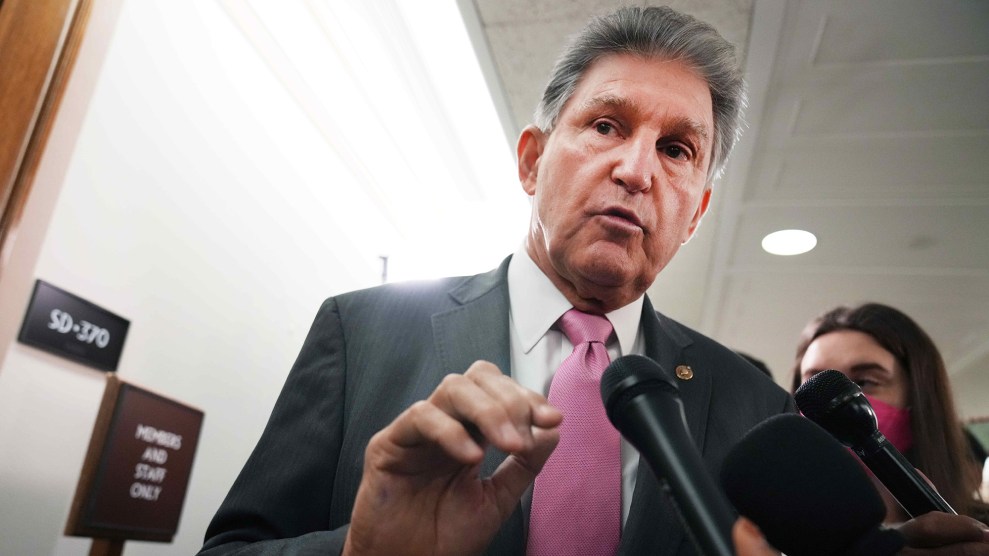
Senator Joe Manchin talks with reporters.Tom Williams/Congressional Quarterly/ZUMA
Over the past few weeks, Sen. Joe Manchin (D-W.Va.) has been involved in some of the most intense Capitol Hill negotiations of recent years. As one of two hold-out Democratic senators impeding passage of President Joe Biden’s trillion-dollar-plus social infrastructure and climate change package, Manchin has been a busy man, constantly conferring with fellow Democrats, privately meeting with Sen. Bernie Sanders (I-Vt.), the chair of the Senate Budget Committee, and often communicating with Biden and White House aides. It’s been a whirlwind, as his threat to vote no has forced the Democrats to cut the Build Back Better bill in half and remove significant clean energy provisions and popular programs, possibly including paid family leave and Medicare expansion. Yet during this hectic and stressful stretch, Manchin has found the time to pursue a side project: a book deal.
In between negotiating sessions that have raised his profile in Washington and across the nation, Manchin has held multiple conversations regarding this book project, according to people with knowledge of this endeavor. And the project has reached the stage of a book proposal being drafted. Manchin has discussed whether the best time to present a proposal to publishers would be during the ongoing drama over the Build Back Better legislation or after a final deal is reached.
Manchin has never written a book. His personal net worth is an estimated $8.6 million, and, according to his most recent personal financial disclosure form, he has holdings in Enersystems, Inc., a coal brokerage business he founded, which were valued between $1 million and $5 million. He was recently spotted driving a Maserati (when climate change activists confronted him in a Washington, DC, parking garage). He was first elected to the Senate in 2010.
Manchin’s position at the center of the latest Washington storm—and a tell-all about this complicated sausage-making—could catch the fancy of publishing houses. One publishing executive estimated that a Manchin book could fetch up to $1.5 million. Sen. Elizabeth Warren (D-Mass.) has received book advances of $250,000 and $525,000. In 2016, Sanders obtained a $795,000 advance for his book Our Revolution: A Future to Believe In.
Manchin has had multiple conversations with agents and has discussed a possible collaborator, according to people with knowledge of this project.
During his interactions with the media in recent weeks, Manchin, who has been pilloried by progressives and social media users for blocking this bill, has seemed eager to explain himself.
In defending his opposition to the full social infrastructure and climate change measure, Manchin has said that he opposes certain programs in the bill—such as paid leave—because they could move the United States toward an “entitlement society.” He also declared, “I will not support a bill that is this consequential without thoroughly understanding the impact it will have on our national debt, our economy and the American people.” He has expressed concern that the package could lead to inflation. And Manchin has warned against the Democrats enacting legislation without any Republican support. He has repeatedly questioned the need to pass a large measure encompassing different issues and has urged his fellow Democrats to find ways to cooperate with Republicans. At a lunch of Senate committee chairs last month—Manchin heads the Energy and Natural Resources Committee—Manchin told his colleagues that he could live with no version of this bill passing. “I’m comfortable with zero,” he said.
Calling himself a “conservative Democrat,” Manchin has been pitching a conservative rationale to justify his actions and has been selling an overall vision of centrist politics that could be the basis for a book.
Last month, Mother Jones reported that Manchin had told associates he was considering leaving the Democratic Party if Capitol Hill Democrats did not agree to his demand to cut the size of the Build Back Better measure. Manchin initially denounced that story as “bullshit” and told reporters, “I have no control of rumors, guys. No control of rumors.” But the next day he conceded he had discussed departing the party because he had become ideologically out of sync with it. Whether or not he splits from the Democrats, Manchin’s travails and alienation from the Democratic Party could well yield material for a book.
Manchin’s press secretary did not respond to multiple requests for comment.
















